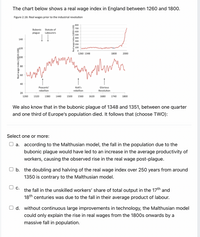
ENGR.ECONOMIC ANALYSIS
14th Edition
ISBN: 9780190931919
Author: NEWNAN
Publisher: Oxford University Press
expand_more
expand_more
format_list_bulleted
Question

Transcribed Image Text:The chart below shows a real wage index in England between 1260 and 1800.
Figure 2.16: Real wages prior to the industrial revolution
800
700
Bubonic Statute of
600
plague
Labourers
500
400
140
300
200
100
1260 1348
1800
2000
80
40
Kett's
rebellion
Peasants
Glorious
rebellion
Revolution
20
1260
1320
1380
1440
1500
1560
1620
1680
1740
1800
We also know that in the bubonic plague of 1348 and 1351, between one quarter
and one third of Europe's population died. It follows that (choose TWO):
Select one or more:
a. according to the Malthusian model, the fall in the population due to the
bubonic plague would have led to an increase in the average productivity of
workers, causing the observed rise in the real wage post-plague.
O b. the doubling and halving of the real wage index over 250 years from around
1350 is contrary to the Malthusian model.
C.
the fall in the unskilled workers' share of total output in the 17th and
18th centuries was due to the fall in their average product of labour.
d. without continuous large improvements in technology, the Malthusian model
could only explain the rise in real wages from the 1800s onwards by a
massive fall in population.
Real wage index (10
Real wage index (1850-100)
Expert Solution
This question has been solved!
Explore an expertly crafted, step-by-step solution for a thorough understanding of key concepts.
This is a popular solution
Trending nowThis is a popular solution!
Step by stepSolved in 2 steps with 1 images

Knowledge Booster
Learn more about
Need a deep-dive on the concept behind this application? Look no further. Learn more about this topic, economics and related others by exploring similar questions and additional content below.Similar questions
- Consider the labour market represented in the following graph: real wage W P equilibrium employment WS PS Employment rate Where WS represents the Wage Setting relationship, and PS represents the Price Setting relationship. Which of the following statements are INCORRECT? Changes in the marginal product of labour will change the equilibrium level of unemployment because it makes the wage setting (WS) curve shift. A non-labour related increase in cost of production, will shift the PS curve downwards. The PS curve is horizontal because changes in prices do not affect the rate employment in the economy. A positive demand shock that increases actual output will move the equilibrium employment to the right of the point E in the graph.arrow_forwardAttached is the unfinshed labor market data for a firm that sells dog treats. Complete the table with the correct values.arrow_forward6. "You mi ght as well say that the unemployment rate would be zero if everyone just quit looking for work." Explain what the author means by this.arrow_forward
- What are the causes of inflexible or sticky wagesarrow_forwardThe figure describes the effect of immigration on unemployment in the labour market. The labour market equilibrium is at A and C before and after the influx of immigration, respectively. Based on this figure, which of the following statements is correct? Real wage 40 20 3 3 Wage-setting curve (before immigration) B Wage-setting curve (after) immigration) Labour force (before Immigration) Price- setting curve Labour force (after immigration) 4 4.5 5 5.5 Employment, millions of workers 6 Firms claim a higher markup in the new equilibrium. The unemployment rate is unchanged in the new equilibrium. All incumbent workers are no worse off in the new equilibrium. All incumbent workers are unaffected while the labour market adjusts.arrow_forwardLook at this graph of real wage index in England between 1260 and 1800. Consider also that, in the bubonic plague of 1348 and 1351, between one quarter and one third of Europe's population died. 800 700 Bubonic plague Statute of 600 Labourers s00 400 140 300 200 100 1260 1348 1800 2000 80 60 40 Peasants rebellion Kett's rebellion Glorious Revolution 20 1260 1320 1380 1440 1500 1560 1620 1680 1740 1800 Select one or more: a. According to the Malthusian model, the fall in the population due to the bubonic plague would have led to an increase in the average productivity of workers, causing the observed rise in the real wage post-plague. b. The doubling and halving of the real wage index over 250 years from around 1350 cannot be explained by the Malthusian model. c. The fall in the unskilled workers' share of total output in the 17th and 18th centuries was due to the fall in their average product of labour. d. In the Malthusian model, the rise in real wages from 1800 onwards, at the same…arrow_forward
arrow_back_ios
arrow_forward_ios
Recommended textbooks for you

 Principles of Economics (12th Edition)EconomicsISBN:9780134078779Author:Karl E. Case, Ray C. Fair, Sharon E. OsterPublisher:PEARSON
Principles of Economics (12th Edition)EconomicsISBN:9780134078779Author:Karl E. Case, Ray C. Fair, Sharon E. OsterPublisher:PEARSON Engineering Economy (17th Edition)EconomicsISBN:9780134870069Author:William G. Sullivan, Elin M. Wicks, C. Patrick KoellingPublisher:PEARSON
Engineering Economy (17th Edition)EconomicsISBN:9780134870069Author:William G. Sullivan, Elin M. Wicks, C. Patrick KoellingPublisher:PEARSON Principles of Economics (MindTap Course List)EconomicsISBN:9781305585126Author:N. Gregory MankiwPublisher:Cengage Learning
Principles of Economics (MindTap Course List)EconomicsISBN:9781305585126Author:N. Gregory MankiwPublisher:Cengage Learning Managerial Economics: A Problem Solving ApproachEconomicsISBN:9781337106665Author:Luke M. Froeb, Brian T. McCann, Michael R. Ward, Mike ShorPublisher:Cengage Learning
Managerial Economics: A Problem Solving ApproachEconomicsISBN:9781337106665Author:Luke M. Froeb, Brian T. McCann, Michael R. Ward, Mike ShorPublisher:Cengage Learning Managerial Economics & Business Strategy (Mcgraw-...EconomicsISBN:9781259290619Author:Michael Baye, Jeff PrincePublisher:McGraw-Hill Education
Managerial Economics & Business Strategy (Mcgraw-...EconomicsISBN:9781259290619Author:Michael Baye, Jeff PrincePublisher:McGraw-Hill Education


Principles of Economics (12th Edition)
Economics
ISBN:9780134078779
Author:Karl E. Case, Ray C. Fair, Sharon E. Oster
Publisher:PEARSON

Engineering Economy (17th Edition)
Economics
ISBN:9780134870069
Author:William G. Sullivan, Elin M. Wicks, C. Patrick Koelling
Publisher:PEARSON

Principles of Economics (MindTap Course List)
Economics
ISBN:9781305585126
Author:N. Gregory Mankiw
Publisher:Cengage Learning

Managerial Economics: A Problem Solving Approach
Economics
ISBN:9781337106665
Author:Luke M. Froeb, Brian T. McCann, Michael R. Ward, Mike Shor
Publisher:Cengage Learning

Managerial Economics & Business Strategy (Mcgraw-...
Economics
ISBN:9781259290619
Author:Michael Baye, Jeff Prince
Publisher:McGraw-Hill Education